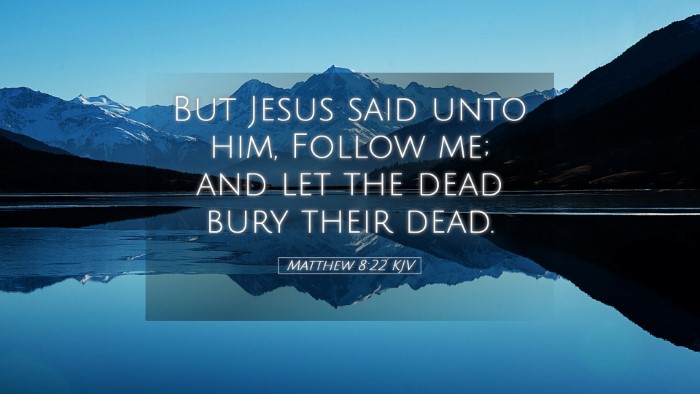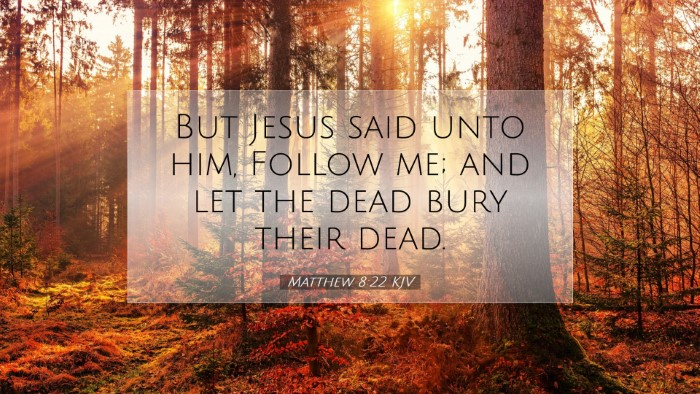Commentary on Matthew 8:22
Matthew 8:22 states: "But Jesus said unto him, Follow me; and let the dead bury their dead." This verse presents a profound teaching on discipleship, commitment, and the nature of spiritual life.
1. Context of the Passage
In the verses preceding this statement, Jesus is approached by a scribe who expresses his desire to follow Him. Jesus responds by highlighting the cost of discipleship and the need for total commitment. Matthew Henry notes that Jesus emphasizes this point to convey that the call to follow Him transcends all worldly ties and obligations.
2. The Call to Follow
Jesus' command to "Follow me" is central to the Christian faith. Albert Barnes remarks that this call is not merely an invitation but a command that requires immediate action. The Greek term used here implies an ongoing commitment to walking in Jesus' footsteps.
2.1 The Importance of Immediate Response
Discipleship requires a readiness to leave behind familiar comforts for the sake of Christ’s mission. Adam Clarke indicates that the phrase hints at the necessity of responding immediately to Christ's call, without procrastination or hesitation.
2.2 A Radical Commitment
This radical nature of following Jesus implies a reprioritization of values. As Barnes elaborates, this could mean leaving behind family, financial security, and societal expectations. The surrendered life to Christ stands in stark contrast to the values of secular society.
3. "Let the Dead Bury Their Dead"
This provocative statement raises questions about its interpretation and implications. The phrase suggests a spiritual truth regarding life and death, which merits careful consideration.
3.1 Understanding the 'Dead'
Adam Clarke suggests that the term "dead" refers metaphorically to those who are spiritually dead, lacking the life of God. In this context, Jesus is instructing that those who are not spiritually alive cannot truly fulfill responsibilities in God’s kingdom.
3.2 Prioritizing the Kingdom
Matthew Henry elaborates that Jesus is highlighting the urgency of the Kingdom of God over traditional duties and relationships. A disciple’s commitment takes precedence over familial obligations, illustrating the often uncomfortable truth that faith can demand sacrifice.
4. The Radical Nature of Discipleship
The teaching encapsulated in Matthew 8:22 reinforces that true discipleship is not just a matter of belief; it demands action and often entails profound sacrifice. Barnes captures this essence beautifully by affirming that following Christ is a higher calling that requires prioritization of spiritual pursuits over earthly ties.
4.1 The Cost of Discipleship
Echoing Luke 14:26, where Jesus speaks of hating one’s family for His sake, this verse also underscores the cost of following Him. It compels the follower to introspect on whether they are genuinely prepared to make this level of commitment.
4.2 A Challenge to Comfort
This radical announcement poses a challenge not just to those in the first century but to believers in contemporary contexts. Pastors and theologians must communicate clearly that comfort and ease do not align with the call of Christ.
5. Application for Today’s Believers
The implications of Matthew 8:22 extend far beyond its historical context into the lives of modern-day Christians. What does it mean today to put Christ above all else? Here are a few points of application:
- Invest in Spiritual Relationships: Choose to prioritize relationships that foster spiritual growth over those that distract from spiritual pursuits.
- Embrace the Gospel Mission: Engage actively in evangelism and disciple-making as a primary focus of life, often at the expense of personal comfort.
- Reflect on Personal Priorities: Take time for personal reflection on what it means to follow Christ fully in various areas of life, from career pursuits to family relationships.
Conclusion
In summary, Matthew 8:22 encapsulates a powerful teaching on the nature of discipleship. It invites rigorous self-examination regarding what it means to be a follower of Christ, challenging believers to evaluate the priority of their commitments. It further emphasizes the concept that following Jesus involves profound sacrifices and urgent action. As pastors, students, and scholars engage with this text, they must convey these truths with clarity and conviction, fostering a deeper understanding of the cost and blessing of living in full obedience to the call of Christ.


